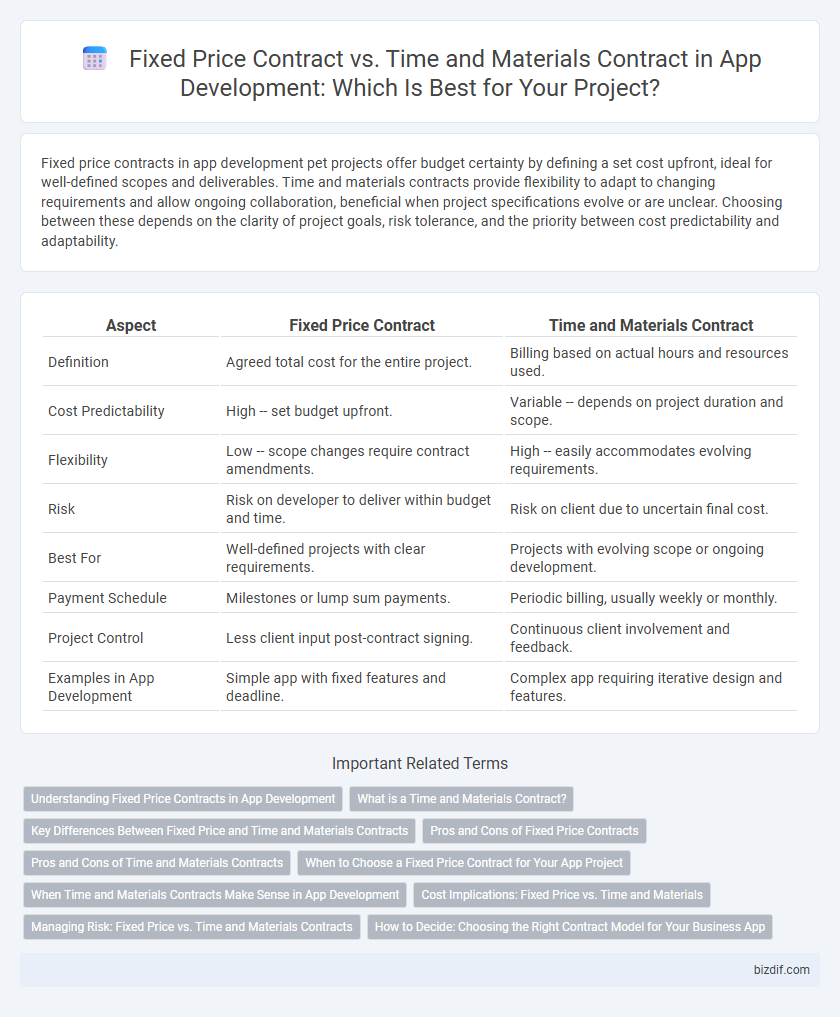Fixed price contracts in app development pet projects offer budget certainty by defining a set cost upfront, ideal for well-defined scopes and deliverables. Time and materials contracts provide flexibility to adapt to changing requirements and allow ongoing collaboration, beneficial when project specifications evolve or are unclear. Choosing between these depends on the clarity of project goals, risk tolerance, and the priority between cost predictability and adaptability.
Table of Comparison
| Aspect | Fixed Price Contract | Time and Materials Contract |
|---|---|---|
| Definition | Agreed total cost for the entire project. | Billing based on actual hours and resources used. |
| Cost Predictability | High -- set budget upfront. | Variable -- depends on project duration and scope. |
| Flexibility | Low -- scope changes require contract amendments. | High -- easily accommodates evolving requirements. |
| Risk | Risk on developer to deliver within budget and time. | Risk on client due to uncertain final cost. |
| Best For | Well-defined projects with clear requirements. | Projects with evolving scope or ongoing development. |
| Payment Schedule | Milestones or lump sum payments. | Periodic billing, usually weekly or monthly. |
| Project Control | Less client input post-contract signing. | Continuous client involvement and feedback. |
| Examples in App Development | Simple app with fixed features and deadline. | Complex app requiring iterative design and features. |
Understanding Fixed Price Contracts in App Development
Fixed price contracts in app development establish a predetermined budget and scope, providing clear cost expectations and minimizing financial risks for clients. This model suits projects with well-defined requirements and low likelihood of changes, ensuring timely delivery within the agreed budget. Developers must carefully assess project specifications to avoid scope creep and ensure profitability under fixed price agreements.
What is a Time and Materials Contract?
A Time and Materials (T&M) contract in app development involves billing the client based on the actual hours worked and materials used, providing flexibility to adapt project scope as needs evolve. This contract type suits projects with uncertain requirements or ongoing changes, allowing developers to address unforeseen challenges without renegotiating the contract. Transparent tracking of labor hours and expenses ensures accurate invoicing and efficient resource management throughout the app development lifecycle.
Key Differences Between Fixed Price and Time and Materials Contracts
Fixed price contracts set a predetermined budget and timeline for app development, ensuring cost predictability but limiting flexibility for scope changes. Time and materials contracts bill clients based on actual hours worked and resources used, offering adaptability but potentially increasing overall costs. Key differences include budget control versus flexibility, risk allocation between client and developer, and project management complexity.
Pros and Cons of Fixed Price Contracts
Fixed price contracts provide budget certainty and clear deliverables, making them ideal for projects with well-defined requirements, yet they lack flexibility to accommodate changing scope or unforeseen challenges. These contracts reduce financial risks for clients but may lead developers to compromise quality or delay deadlines to stay within the fixed budget. Choosing a fixed price model requires thorough project planning and detailed specifications to minimize disputes and ensure successful app development outcomes.
Pros and Cons of Time and Materials Contracts
Time and materials contracts offer flexibility during app development by allowing adjustments to project scope and requirements without renegotiating the entire contract, which benefits evolving projects. This contract type provides transparency as clients pay for actual hours worked and materials used, but it can lead to higher costs if the project extends beyond initial estimates. The lack of a fixed price may pose budgeting challenges, requiring diligent project management to avoid scope creep and unexpected expenses.
When to Choose a Fixed Price Contract for Your App Project
Choose a fixed price contract for your app project when the scope, features, and requirements are clearly defined and unlikely to change. This contract type is ideal for well-planned projects with established timelines and budgets, minimizing financial risks. Fixed price agreements provide predictable costs, making them suitable for startups and businesses with strict budget constraints.
When Time and Materials Contracts Make Sense in App Development
Time and Materials contracts make sense in app development projects with evolving requirements or unclear scope, allowing flexibility for iterative design and feature adjustments. This model supports ongoing collaboration between developers and stakeholders, optimizing resource allocation based on actual work performed. It is ideal for innovative apps, startups, or projects where rapid changes and scalability are essential.
Cost Implications: Fixed Price vs. Time and Materials
Fixed price contracts offer a set budget, minimizing financial risk by locking project costs but may limit flexibility for scope changes. Time and materials contracts allow for adaptable budgeting based on actual hours and resources used, which can lead to fluctuating costs but better accommodate evolving project requirements. Choosing between these models depends on project clarity, risk tolerance, and financial control priorities in app development.
Managing Risk: Fixed Price vs. Time and Materials Contracts
Fixed price contracts mitigate financial risk by locking the total project cost, ensuring predictable budgeting for app development. Time and materials contracts offer flexibility to accommodate changing requirements but expose clients to potential cost overruns if scope expands. Effective risk management involves selecting a contract type aligned with project complexity and certainty of specifications.
How to Decide: Choosing the Right Contract Model for Your Business App
Selecting the right contract model for your business app depends on project scope clarity and budget flexibility; fixed price contracts suit well-defined projects with set requirements, ensuring predictable costs and deadlines. Time and materials contracts are ideal when project specifications are evolving or innovation is prioritized, allowing adaptive work and real-time resource allocation. Assessing your app development needs, risk tolerance, and control preference guides the choice between fixed price's certainty and time and materials' flexibility.
Fixed price contract vs Time and materials contract Infographic

 bizdif.com
bizdif.com